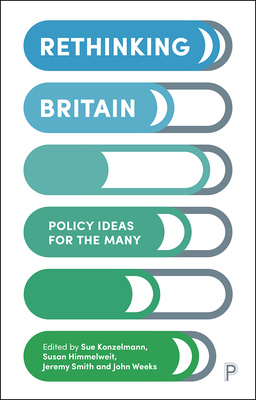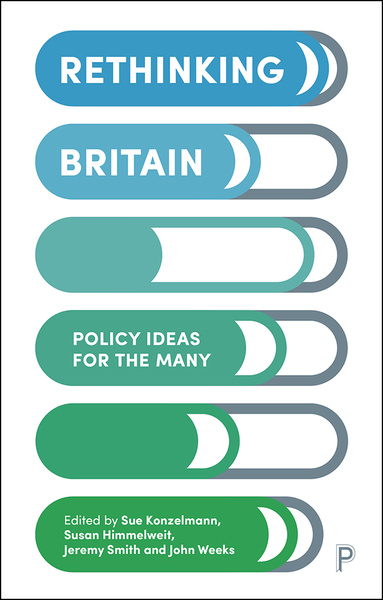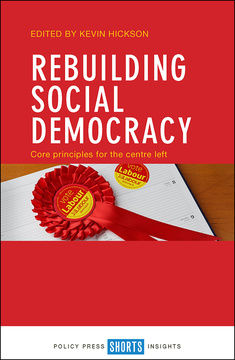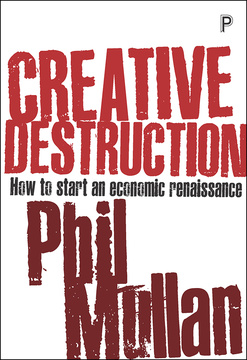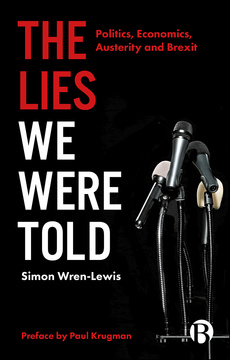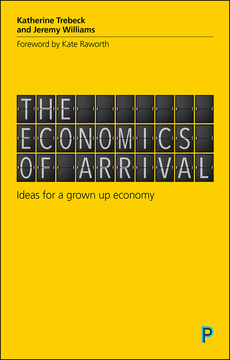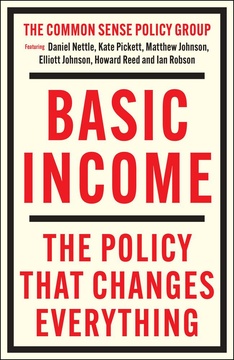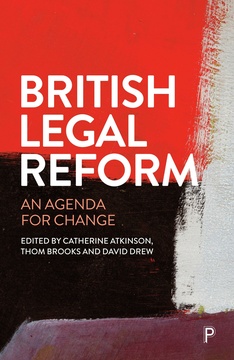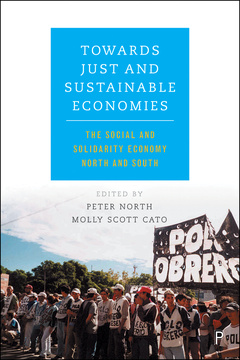Rethinking Britain
Policy Ideas for the Many
Edited by Sue Konzelmann, Susan Himmelweit, Jeremy Smith and John Weeks
Published
Sep 19, 2019Page count
288 pagesISBN
978-1447352525Dimensions
216 x 138 mmImprint
Policy PressPublished
Sep 19, 2019Page count
288 pagesISBN
978-1447352532Imprint
Policy PressPublished
Sep 19, 2019Page count
288 pagesISBN
978-1447352532Imprint
Policy Press
Get to grips with the language of economic policy with this free jargon buster from the book
In the media
On our blog: The electoral avalanche saw no evidence of a shift to the centre
On our blog: Never mind the ballots: We need to think about where our economy is going
On our blog: Rethinking Britain: Policy ideas for the many
On our blog: What if Cameron’s austerity had been “harder and faster”?
What if we had a government prepared to implement the policies that could radically change 21st-century Britain and improve people’s lives?
Social and economic policies are rarely communicated clearly to the public, but it’s never been more important for citizens to understand and contribute to the debate around the country’s future.
In everyday language, Rethinking Britain presents a range of ideas from some of the country’s most influential thinkers such as Kate Pickett and Ha-Joon Chang. From inflation to tax, and health to education, each contribution offers solutions which, if implemented, would lead to a fairer society.
Curated by leading economists from the Progressive Economics Group and accompanied by a ‘jargon buster’, this book is an essential aid for citizens who are interested in critiquing inequalities while looking to build a better future.
“The collection [of essays] provides a great deal of food for thought, and the sense that there really are things worth trying in response to what can seem like intractable social policy problems.’’ Citizen’s Basic Income Trust
"Essential reading for politicians and citizens alike. It provides an insightful and accessible guide to progressive policies towards the economy and social sectors, challenging prevalent ‘austerity’ and market-dominated approaches." Frances Stewart, Oxford Department of International Development
"In the face of climate and social breakdown we urgently need new public policy ideas. Rethinking Britain has them in wonderful, creative and powerful bucketfuls. It’s a must read for anyone who wants to reclaim Britain for the many, not the few." Paul Chatterton, University of Leeds
"Brexit has displaced other policy issues, so this review of a variety of progressive proposals, with its helpful jargon buster, is a very valuable reminder of what needs to be done." Ron Smith, Birkbeck University of London
"The professional economists behind this book write with the conviction that informed citizens are empowered citizens - and the foundation of democracy. For those wanting to understand the economic forces shaping our lives and our country, this is a must-read." Ann Pettifor, Policy Research in Macroeconomics (PRIME)
“Convincingly makes the case for a radical approach to policy making. Rethinking Britain is as urgent as it is readable.” Robert Skidelsky, University of Warwick
Sue Konzelmann is Reader in Management at Birkbeck, University of London. An economist by training, she is Co-executive Editor of Cambridge Journal of Economics.
Susan Himmelweit is Emeritus Professor of Economics at the Open University. She is a past president of the International Association for Feminist Economics and founding chair and active member of the UK think tank the Women’s Budget Group. Her research interests are in gender issues in economic and social policy.
Jeremy Smith is Co-Director of Prime Economics and a barrister by profession. He was formerly Chief Executive of the London Borough of Camden, and later worked for local government in Europe and internationally. He is an expert in international urban development, as well as EU and national constitutional issues.
John Weeks (1941-2020) was Emeritus Professor in the Department of Development Studies, SOAS University of London.
Foreword ~ Patrick Allen;
Introduction ~ Jeremy Smith;
Interlude: ‘Mirror, mirror, on the wall – who has the highest debt of all?' ~ Sue Konzelmann and Marc Fovargue-Davies;
PART ONE: BUILDING A FULL-EMPLOYMENT ECONOMY;
Introduction ~ John Weeks;
When is austerity an appropriate economic policy? ~Sue Konzelmann;
Using the budget to manage output and employment ~ John Weeks;
Why assessing the equality impact of economic policies matters ~ Susan Himmelweit and Mary-Ann Stephenson;
How should we manage inflation? ~ John Weeks;
What should guide monetary policy? ~ Jan Toporowski;
Does the UK really have too much debt? ~ John Weeks;
The macroeconomic role of progressive taxation ~ John Weeks;
How do we build a fairer tax system? ~ Richard Murphy;
Should we have fiscal rules? ~ Jeremy Smith;
Interlude: Has privatisation come off the rails? ~ Sue Konzelmann and Marc Fovargue-Davies;
PART TWO ~ PUBLIC INVESTMENT – PRIORITISING SOCIETY RATHER THAN PROFIT;
Introduction ~ Sue Konzelmann and Marc Fovargue-Davies;
How could we build competitive new UK industries? ~ Sue Konzelmann and Marc Fovargue-Davies;
Reindustrialising the UK ~ Antonio Andreoni and Ha-Joon Chang;
How can labour law be the instrument of progressive economic policy? ~ Keith D. Ewing and John Hendy QC;
Wage policy and public investment for sustainable development ~ Özlem Onaran;
How do we build a sustainable economy? ~ Dan O'Neill
Investing in social infrastructure ~ Susan Himmelweit;
Why should the railway be renationalised? ~ Jeff Tan;
How can we fix the broken energy sector? ~ Hulya Dagdeviren;
Interlude: Why should citizens invest in losses, rather than for profit? ~ Sue Konzelmann and Marc Fovargue-Davies;
PART THREE: MAKING FINANCE WORK FOR SOCIETY;
Introduction ~ Sue Konzelmann and Marc Fovargue-Davies;
Why the UK needs a much better Companies Act ~ Simon Deakin;
What should be the limits to limited liability? ~ Colin Haslam;
Why do we need publicly listed companies? ~ Alan Shipman;
How can citizens’ wealth funds address the problem of inequality? ~ Stewart Lansley;
How can finance better serve the real economy? ~ Alan Shipman;
How can we channel credit to small and medium-sized enterprises (SMEs)? ~ John Marlow;
What can we learn from Germany’s national development bank? ~ Stephany Griffith-Jones and Natalya Naqvi;
Interlude: Safe as (council) houses... ~ Sue Konzelmann and Marc Fovargue-Davies;
PART FOUR: GENUINE SOCIAL SECURITY;
Introduction ~ Susan Himmelweit;
How can we tackle the UK’s private debt crisis? ~ Johnna Montgomerie;
How can we address the concerns of renters, without crashing house prices? ~ Beth Stratford and Duncan McCann;
How do we make occupational pension funds fit for purpose? ~ Bruno Bonizzi and Jennifer Churchill;
How can we stop the social security system aggravating mental distress? ~ John Grahl;
Reconstructing social security ~ Simon Deakin;
How could Universal Basic Income (UBI) improve social security? ~ Stewart Lansley and Howard Reed;
Would Universal Basic Income (UBI) address the causes of inequality, ill-being and injustice? ~ Ian Gough;
Interlude: What is ‘social’ infrastructure – and why does it matter so much? ~ Sue Konzelmann and Marc Fovargue-Davies;
PART FIVE: HOW TO PROVIDE FOR SOCIAL NEEDS;
Introduction ~ Susan Himmelweit;
How can we stop privatisation of public services? ~ Leslie Huckfield;
What has the market done to the English NHS and with what should we replace it? ~ Pauline Allen;
What’s the best way to tackle health inequalities? ~ Kate Pickett;
What’s the best way of delivering social care? ~ Jane Lethbridge;
How do we make drug prices an easier pill for the NHS to swallow? ~ Dean baker;
How much would high-quality childcare cost and how would we pay for it? ~ Jerome De Henau;
What should be done about private schools? ~ Francis Green and David Kynaston;
How do we make lifelong learning a reality for all? ~ Liz Marr;
Conclusion ~ Jeremy Smith;
Jargon busters
References and further reading







